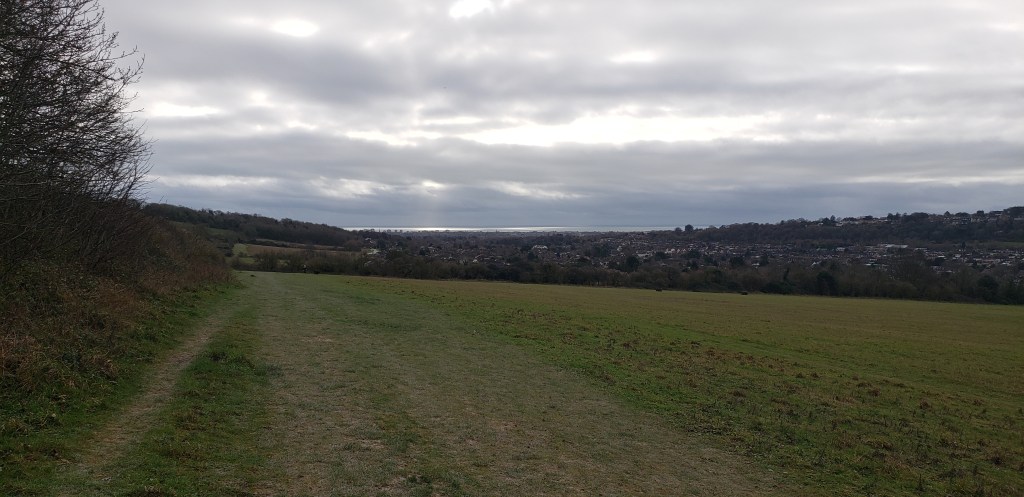I’m preparing a Spanish tortilla in my folks kitchen. I can only describe the sounds coming out of my phone as “fluid landscape”. The Reeling by Brighde Chaimbeul, the award-winning young piper from Skye. We had a family holiday on Skye in September 1998 that I will never forget, and the Reelings are bringing back images of The Cuillins and the peaty nose of Talisker whisky. We drove all the way in two cars from Surrey, stopping overnight in Carlisle . My sister Kiri and I played Eliza Carthy ‘s Red / Rice , and Lunasa‘s eponymous debut. It was folk heaven.
In my previous post, I described how walking can sometimes feel like a melody unfolding. While up in the Sussex Downs ( I always love that sweet contradiction of being Up in the Down’s) this week, I felt poorly equipped as I struggled to recall any songs that fitted the occasion. Bushcraft folk do you teach trail songs? For some reason the one song I can remember from Eliza Carthy’s Red Rice is The Herring Song, which i sung while at the Scything Gathering last year. Lines from a Martin Carthy song rattle around in my head too.
“I’ve got a dog, he’s a good dog too, I have him in my keeping He catch them hares that run by night while the gamekeeper lies sleeping”
Then there’s the old Cub Scout classics I picked up during my short time with 3rd Stoneleigh Cubs such as “Oh You’ll Never Get to Heaven” which was followed by various items such as “In a baked bean tin or “In a jumbo jet with various reasons why that wouldn’t work (“Cos a baked bean tins got baked beans in”). I was always curious about the chorus of that particular number:
I ain’t gonna grieve, my lord no more,
I ain’t gonna grieve my lord,
I ain’t gonna grieve my lord,
I ain’t gonna grieve my lord no more.
Of course there were other snippets of popular music and even Beethoven’s Ode to Joy, still lodged upstairs after our School choir sang it with other Surrey Choirs in Guildford back in 1980-something. Suffice to say I feel vocally unprepared for singing as I walk.
I’ve been recently pondering the power of participatory singing to connect people and the land. At our scything gathering we were treated to and participated in some singing led by Folk Camp friends Bozena Hrycyna (@thisfolklife) from Kosa Kolektiv and Blair Richards-Koeslag . At our Mount Wolfe Farm Winter Solstice celebration this year Steffanie and friends from Waterloo sang The Humble Song by Ode’min Kwe Singers. Just before Christmas I supported Kiri as she sang as part of the The Birch Folk Choir in the centre of Dorking seasonal gems such as The First Tree In the Greenwood, All Shall Be Well and Auld Lang Syne. There is magic when we get together and sing.
So what did I do when I ran out of songs? My mother has this wonderful gift where she can make a song about almost anything, and I seem to have inherited it. So as I walked around Cissbury Ring I sang the things that I saw and the feelings that came up, to the rhythm of my feet and the melody of my heart.





Clip/ A song for the roundness of the hill fort and the well worn chalk path
Clop/ A song for the blue sky and the sparkling sea beyond
Clip/ A song for the brambles and the yellow gorse flowers
Clop/ A song for the Guardian Oaks and the row of beeches
Clip/ A song for the South Downs beneath the encroaching clouds
Clop/ A song for the ponies grazing the steps
Clip/ A song for the East, South, West and North and the turning thereon.
Clop/ A song for the kestrel hovering on the breeze, waiting
Clip/ Waiting
Clop/ Waiting
Clip/ Waiting
Clop/ Waiting…and thwarted sinking off to down the slope
Clip/ A song for the people once and to come
Clop / A song for my singing..I won’t stop now I have begun.
I changed step to clip/clop in honour of the ponies!
As a researcher I’m interested in the power of narratives and stories in helping us make sense of the world and understand how to act in the knowledge that we are storytelling beings. Much as I cherish a good story, langage may however present obstacles to understanding the unity of things or a holistic sensemaking. The Singing Neanderthal Hypothesis suggests our vocal chords evolved not for speaking but for singing, and our earliest ancestors likely relied on intonation, pitch and rhythm to make sense of and communicate in their world.
I intend to proceed with my walking and singing this year, and record in this blog how it makes me feel. I welcome suggestions for good walking songs!
